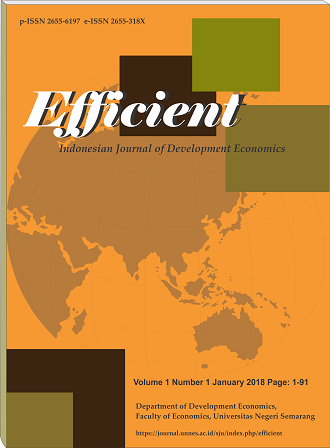Implementation of Swadaya Housing Stimulant Assistance
Abstract
People who are less fortunate still find it difficult to get access to decent homes. The Government of Indonesia through the Ministry of Public Works and Housing has developed a program that is oriented towards housing development, namely the Self-Help Housing Stimulant Assistance aimed at Low-Income Communities. The purpose of this study is to measure the success of the implementation of Self-Help Housing Stimulant Assistance in Tempuran Village, Bringin District, Semarang Regency. The research method used is descriptive percentage. The type of data used is primary data using a questionnaire. The variables used are program standards and targets, institutional capacity, funding and social and political conditions. The results of the study, the percentage of standard variables and program targets is 73% categorized as successful. The results of the analysis of the percentage of institutional capacity variables that is 73% are categorized successful. The results of the analysis of the percentage of financing variables are 86% until the categorization is very successful. The results of the analysis of the percentage of social and political conditions variables are 44% categorized quite successful. The policy implications, assistance and supervision of the Field Facilitator are needed for the KPB to carry out its development independently, the need for prior notification of the preparation of additional self-funding in the BSPS program by the beneficiary community itself for the completion of the housing construction process, the need for participation from surrounding communities and interest groups who have the opinion that the implementation goes well.
Masyarakat yang kurang beruntung masih sulitnya akses untuk mendapatkan rumah layak huni. Pemerintah Indonesia melalui Kementeriann PUPR membuat suatu program yang berorientasi pada pembangunan perumahan yaitu Bantuan Stimulan Perumahan Swadaya ditujukan bagi Masyarakat Berpenghasilan Rendah. Tujuajn penelitian ini adalah untuk mengukur keberhasilan impelementasi Bantuan Stimulan Perumahan Swadaya di Desa Tempuran Kecamatan Bringin Kabupaten Semarang. Metode penelitian yang digunakan adalah deskriptif persentase. Jenis data yang digunakan adalaah data primer dengan menggunakan kuesioner. Variabel yang digunakan adalah standar dan sasaran program, kapasitas kelembagaan, pembiayaan serta kondisi sosial dan politik. Hasil penelitian persentase variabel standar dan sasaran program adalah sebesar 73% dikategorikan berhasil. Hasil analisis persentase variabel kapasitas kelembagaan yaitu 73% dikategorikan berhasil. Hasil analisis persentase variabel pembiayaan adalah 86% sdikategorikan sangat berhasil. Hasil analisi persentase variabel kondisi sosial dan politik adalah 44% dikategorikan cukup berhasil. Implikasi kebijakan, pendampingan dan pengawasan dari Tenaga Fasilitator Lapangan diperlukan agar KPB melakukan pembangunannya secara swadaya, perlunya pemberitahuan terlebih dahulu untuk persiapan dana tambahan swadaya pada program BSPS oleh masyarakat penerima bantuan itu sendiri demi terselesaikannya proses pembangunan rumah, perlunya partisipasi dari masyarakat sekitar serta kelompok kepentingan yang berpengarung agar implementasi berjalan dengan baik.






